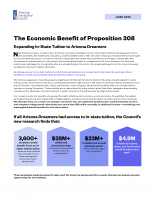- Fact Sheet
The Economic Benefits of Proposition 308: Expanding In-State Tuition to Arizona Dreamers
Published
New research from the American Immigration Council highlights the crucial role that new Americans play in Arizona’s economy, including in some of the state’s fastest-growing and most in-demand fields, like healthcare, education, and the skilled trades. Still, the state is facing critical workforce shortages across the skills and education spectrum. One meaningful way for Arizona to remain competitive and tackle these workforce shortages is by increasing access to higher education for Dreamers. By passing Proposition 308, Arizona would join more than 20 states that recognize the financial hardship that out-of-state tuition imposes on young Dreamers. Granting access to in-state tuition to all Arizona graduates is an important step toward meeting critical workforce needs and would greatly benefit the state’s economy.
If all Arizona high school graduates had access to in-state tuition, the Council’s new research finds that:
- More than 3,600 Arizona students would benefit from an in-state tuition policy every year. Based on the enrollment rates of students from similar demographic and socioeconomic backgrounds, we estimate that an additional 3,653 Dreamers in the state would be able to enroll in college.
- Earning a college degree by paying in-state tuition would boost the earnings of Arizona’s Dreamers by more than $28 million annually, elevating their spending power by more than $23 million annually. If in-state tuition policy covering Dreamers became law in Arizona, at least 2,169 of these newly enrolled students would go on to graduate college within six years. Collectively, that group would earn $28.2 million in additional income annually after graduation—translating into meaningful financial benefits for the entire state through taxes and consumer spending.
- In-state tuition access could raise an additional $4.9 million per year in federal income taxes and state and local taxes. The higher wages of new graduates would allow them to spend more as consumers, benefiting the state in the form of sales, excise, and property tax revenues, among others. We estimate that the 2,169 Dreamers who would benefit from in-state tuition and graduate within six years would pay as much as $2.4 million in additional federal income taxes as well as an additional $2.4 million in state and local taxes.
- Arizona is grappling with growing demand in healthcare, K-12 education, and the skilled trades. Immigrants are already helping Arizona meet its growing workforce needs; removing barriers for Dreamers could help the state shore up critical industries.
Help us fight for immigration justice!
The research is clear – immigrants are more likely to win their cases with a lawyer by their side. But very few can get attorneys.
Introducing the Immigration Justice Campaign Access Fund.
Your support sends attorneys, provides interpreters, and delivers justice.

Immigration Justice Campaign is an initiative of American Immigration Council and American Immigration Lawyers Association. The mission is to increase free legal services for immigrants navigating our complicated immigration system and leverage the voices and experiences of those most directly impacted by our country’s immigration policies to inform legal and advocacy strategies. We bring together a broad network of volunteers who provide legal assistance and advocate for due process for immigrants with a humane approach that includes universal legal representation and other community-based support for individuals during their immigration cases.

